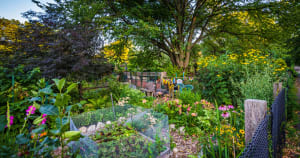Fenway Victory Gardens 80th Anniversary Celebration - Open Gardens Event
Saturday, Jul 16, 2022 10:00a -
2:00p
Where:
The Fenway Victory Gardens
1200 Boylston Street
Boston, MA 02215
Admission:
FREE
Categories:
Accessible Spots, Animals, Art, Date Idea, Farms, Food, Games, Good for Groups, History, Kid Friendly, LGBTQ+, Nature, Outside, Pet Friendly, Photoworthy, Seasonal, Social Good
Event website:
https://fb.me/e/2t5KdKsz1
On Saturday, July 16th, the Fenway Victory Gardens will open our doors to the public for an all-inclusive Open Gardens event. Our community of 475 members invites the public, friends, neighbors, and fellow gardeners to tour our grounds which span 7.5 acres and contain over 500 garden plots. View a wide spectrum of flower and vegetable gardens, learn new gardening tips, and get inspired. Free to attend and family-friendly, the Fenway Victory Gardens will host a series of exciting activities throughout the day including scavenger hunts, cornhole, raffles, birdwatching tours, and plenty of photo opportunities (dahlias and hydrangeas will be at their peak!)
Visitors are invited to bring lunch and snacks to enjoy on the many grassy areas within our garden. In the event of rain or excessive heat (over 90 degrees), this event will be rescheduled to Sunday, July 17th.
Pet-friendly event! Dogs are welcome as long as they are leashed. We ask owners to abide by laws as outlined by the City Boston's Park Rules and Regulations.
Pick up a flyer or download a map at our Event Tent, which will be located at the main entrance of our gardens (1200 Boylston Street). For more information, please contact Amy Johnson ([email protected]).
MAPS AND TRANSPORTATION
We are located at 1200 Boylston Street, Boston MA 02215. While there is no parking available inside the gardens, there is metered parking available along Bolyston Street, and free two-hour visitor parking along Park Drive.
Blue Bikes: There is a Blue Bike Hub at Fenway Park, down the street from the Victory Gardens. (Boylston St near the intersection with Jersey Street)
Public transportation: We are a short walk from Kenmore (Green Line), Ruggles (Orange Line), or MFA (Green Line).
HISTORY
When the United States entered World War II after the bombing of Pearl Harbor, the nation’s food resources were already stretched thin. Once operating at a surplus, U.S. farmers were sending a large portion of their crops overseas to aid the Allies and alleviate the growing food shortage in Europe. With U.S. troops heading to war, there was an ever greater demand for food as only well-fed soldiers could serve at full strength.
In response to the increasing need for food, the U.S. government implemented the Food Rationing Program in 1942, which called on U.S. citizens to conserve their food consumption and avoid waste. In conjunction with rationing, the government also asked civilians to plant “Victory Gardens” and consume the produce they grew. The slogan “Food For Freedom,” originally coined during World War I, was repurposed to great effect.
There is evidence of this very garden movement in Boston’s Fenway neighborhood today. Among the 49 areas obtained for gardens by the Boston Victory Garden Committee, one large plot was established in what is now known as the Back Bay Fens. Area community members could apply for their own plots to aid the war effort, and receive instruction if they were novice gardeners. In order to encourage better gardening and crop yield, Victory Gardeners also held contests and exhibitions.
The gardens remained in this form until the war was drawing to a close and the need for food rationing in the U.S. lessened. In 1944, a group of plot-holding gardeners who feared losing usage of the land assembled with the goal of continuing their urban gardening beyond the war. They established the Fenway Garden Society, and the MHS has their papers in its collections.
The Fenway Garden Society held its first meeting on 15 October 1944, with 23 members in attendance. According to the meeting notes, the society’s object was to “promote the planting and growing of vegetables for home usage.” The society continued to be part of the war effort into 1945, when Chester Bowes of the War Food Administration in Washington, D.C., “wrote stating more food would be necessary.” However, by 1946 the National Victory Garden Commission had dissolved and the society shifted its focus to the general benefits of gardening.
They continued to hold contests to encourage good gardening, giving out small cash prizes and the coveted gold star to winners. They also wrote open letters to gardeners to encourage them to become involved in the society’s work and promote knowledge of gardening.
The Fenway Garden Society often faced an uphill battle in maintaining the piece of land used for the garden plots in what continues to be a highly desirable part of Boston. In one of their first open letters in 1946 they referenced “a petition asking for the gardens for this year, and expressing appreciation for them in the past” and encouraged prospective and current gardeners to sign. There would be many more occasions when the society’s members would have to advocate to maintain their land. Throughout the years, attempts have been made to build hospitals, schools, and parking lots on that land, and it has only been through the Fenway Garden Society’s efforts, and media and legislative support, that the community gardens have remained.
Today the Fenway Victory Gardens are a Boston Historic Landmark. The Fenway Garden Society still exists today and tends the same land in the Fens, which now consists of 500 individual plots cultivated by a diverse group of gardeners.
-

Sponsored -

Sponsored -

Sponsored -

SponsoredGood Morning Newbury Street, with coffee!
Saturday, Apr 26, 2025 9:00a
Outside the Newbury Hotel entrance
-

Sponsored -

Sponsored -

SponsoredEarth Day n Night - A 12 Hour Indie Music, Art & EDM Experience
Saturday, Apr 26, 2025 1:00p
The Great American Beer Hall
-

SponsoredLocal Literary Journal Warehouse Launch Party
Friday, Apr 25, 2025 7:00p
Life Drawing Boston Studios

